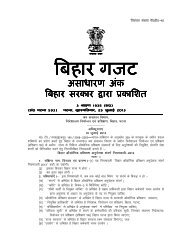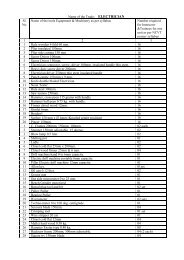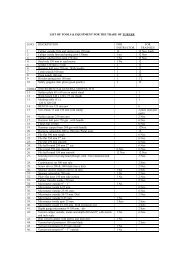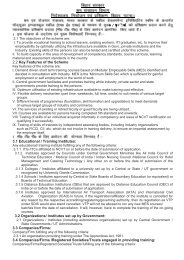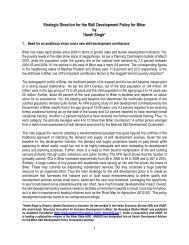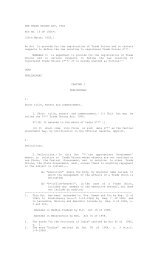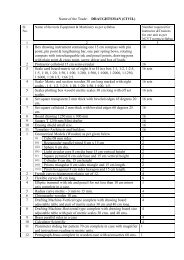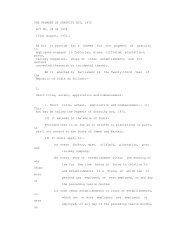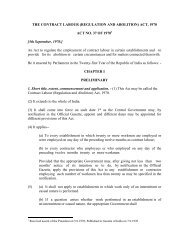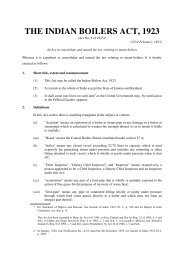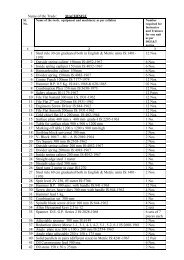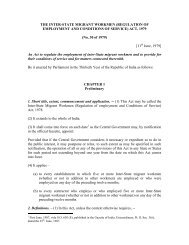working journalists and other newspaper employees - Ministry of ...
working journalists and other newspaper employees - Ministry of ...
working journalists and other newspaper employees - Ministry of ...
- No tags were found...
Create successful ePaper yourself
Turn your PDF publications into a flip-book with our unique Google optimized e-Paper software.
WORKING JOURNALISTS AND OTHER NEWSPAPER EMPLOYEES(CONDITION OF SERVICE) AND MISCELLANEOUS PROVISIONS ACT,1955(N0. 45 OF 1955)1(20th December, 1955)An Act to regulate certain conditions <strong>of</strong> service <strong>of</strong> <strong>working</strong> <strong>journalists</strong> <strong>and</strong><strong>other</strong> persons employed in <strong>newspaper</strong> establishments.Be it enacted by the Parliament in the Sixth Year <strong>of</strong> the Republic <strong>of</strong> India asfollows:CHAPTER IPreliminary1. Short title <strong>and</strong> commencement.-- (1) This Act may be called the2[Working Journalists <strong>and</strong> Other Newspaper Employees] (Conditions <strong>of</strong> Service)<strong>and</strong> Miscellaneous Provisions Act, 1955.(2) It extends to the whole <strong>of</strong> India 3[***]2. Definitions.-- In this Act, unless the context <strong>other</strong>wise requires-4[(a)”Board” means –(i) in relation to <strong>working</strong> <strong>journalists</strong>, the Wage Board constitutedunder section 9; <strong>and</strong>(ii) in relation to non-<strong>journalists</strong> <strong>newspaper</strong> <strong>employees</strong>, the WageBoard constituted under section 13-C;](b) “<strong>newspaper</strong>” means any printed periodical work containing publicnews or comments on public news <strong>and</strong> includes such <strong>other</strong> class <strong>of</strong> printedperiodical work as may, from time to time, be notified in this behalf by theCentral Government in the Official Gazette;(c) “<strong>newspaper</strong> employee” means any <strong>working</strong> journalist, <strong>and</strong> includesany <strong>other</strong> person employed to do any work in or in relation to any <strong>newspaper</strong>establishment;(d) “<strong>newspaper</strong> establishment” means an establishment under thecontrol <strong>of</strong> any person or body <strong>of</strong> persons, whether incorporated or not, for theproduction or publication <strong>of</strong> one or more <strong>newspaper</strong> or for conducting any newsagency or syndicate; 5[<strong>and</strong> includes <strong>newspaper</strong> establishments specified as oneestablishment under the Schedule.Explanation: - For the purposes <strong>of</strong> this clause-(a) different departments, branches <strong>and</strong> centres <strong>of</strong> <strong>newspaper</strong>establishments shall be treated as parts there<strong>of</strong>,-(b) a printing press shall be deemed to be a <strong>newspaper</strong> establishment ifthe principal business there<strong>of</strong> is to print <strong>newspaper</strong>]1 Published in the Gazette <strong>of</strong> India, Extraordinary, Pt.II, Sec I, No. 60, dated the 21st December, 1955.2 Subs by Act 60 <strong>of</strong> 1974, sec. 23 Omitted by Act 51 <strong>of</strong> 1970, sec. 2 <strong>and</strong> Schedule for the words ’except the State <strong>of</strong> Jammu <strong>and</strong> Kashmir.4 subs. by Act 60 <strong>of</strong> 1974, Sec. 3.5 Ins. by Act 31 <strong>of</strong> 1989, sec.2.
6[(dd) “non-journalist <strong>newspaper</strong> employee” means a person employedto do any work in, or in relation to, any <strong>newspaper</strong> establishment, butdoes not include any such person who-(i) is a <strong>working</strong> journalist, or(ii) is employed mainly in a managerial or administrativecapacity, or(iii) being employed in a supervisory capacity, performs eitherby the nature <strong>of</strong> the duties attached to his <strong>of</strong>fice or byreason <strong>of</strong> the powers vested in him, functions mainly <strong>of</strong> amanagerial nature;(e) “prescribed” means prescribed by rules made under this Act;7[(ee) Tribunal means-(i) in relation to <strong>working</strong> <strong>journalists</strong>, the Tribunal constitutedunder sec. 13-AA; <strong>and</strong>(ii) in relation to non-<strong>journalists</strong> <strong>newspaper</strong> <strong>employees</strong>, theTribunal constituted under sec. 13-DD]8(eee) “wages” means all remuneration capable <strong>of</strong> being expressed interms <strong>of</strong> money, which would, if the terms <strong>of</strong> employment, expressed orimplied, were fulfilled, be payable to a <strong>newspaper</strong> employee in respect<strong>of</strong> his employment or <strong>of</strong> work done in such employment , <strong>and</strong> includes-(i) such allowances (including dearness allowance) as the<strong>newspaper</strong> employee is for the time being entitled to;(ii) the value <strong>of</strong> any house accommodation, or <strong>of</strong> supply <strong>of</strong>light, water, medical attendance or <strong>other</strong> amenity or <strong>of</strong>any service or <strong>of</strong> any concessional supply <strong>of</strong> foodgrains or<strong>other</strong> articles;(iii) any traveling concession,but does not include-(a) any bonus;(b) any contribution paid or payable by the employer to anyperson fund or provident fund or for the benefit <strong>of</strong> the<strong>newspaper</strong> employee under any law for the time being inforce;(c) any gratuity payable on the termination <strong>of</strong> his service.Explanation- In this clause, the term “wages” shall also includenew allowances, if any, <strong>of</strong> any description fixed from time totime.](f) “<strong>working</strong> journalist” means a person whose principalavocation is that <strong>of</strong> a journalist <strong>and</strong> 9[who is employed as such,either whole-time or part-time, in, or in relation to, one or more<strong>newspaper</strong> establishment] <strong>and</strong> includes an editor, a leader,writer, news-editor, sub-editor, feature-writer, copy-tester,6 Ins. by Act 60 <strong>of</strong> 1974 , sec. 27 Ins. by Act 6 <strong>of</strong> 1979, sec. 2 (w.e.f 31st January, 1979)8 Ins. by Act 31 <strong>of</strong> 1089, sec. 2.9 Subs. by Act 36 <strong>of</strong> 1981 (w.e.f. 13th August, 1981)
eporter, correspondent, cartoonist, news-photographer <strong>and</strong>pro<strong>of</strong>-reader, but does not include any such person who --(i) is employed mainly in a managerial or administrative capacity;or(ii) being employed in a supervisory capacity, performs, either bythe nature <strong>of</strong> the duties attached to his <strong>of</strong>fice or by reason <strong>of</strong> thepowers vested in him, function mainly <strong>of</strong> a managerial nature:(g) all words <strong>and</strong> expressions used by not defined in this Act <strong>and</strong>defined in the Industrial Disputes Act, 1947 (XIV <strong>of</strong> 1947), shallhave the meanings respectively assigned to them in that Act.CHAPTER IIWORKING JOURNALISTS3. Act XIV <strong>of</strong> 1947 to apply to <strong>working</strong> <strong>journalists</strong>. –- (1) The provisions<strong>of</strong> the Industrial Dispute Act, 1947 (XIV <strong>of</strong> 1947). as in force for the time being,shall, subject to the modification specified in sub-section (2), apply to, or inrelation to, <strong>working</strong> <strong>journalists</strong> as they apply to, or in relation to, workmenwithin the meaning <strong>of</strong> the Act.(2) Section 25 –F <strong>of</strong> the aforesaid Act, in its application to <strong>working</strong>journalist, shall be construed as if in Cl. (a) there<strong>of</strong>, for the period <strong>of</strong> noticereferred to therein in relation to the retrenchment <strong>of</strong> a workman, the followingperiods <strong>of</strong> notice in relation to the retrenchment <strong>of</strong> a <strong>working</strong> journalist hadbeen substituted, namely.-(a) six months, in the case <strong>of</strong> an editor, <strong>and</strong>(b) three months, in the case <strong>of</strong> any <strong>other</strong> <strong>working</strong> journalist.4. Special provisions in respect <strong>of</strong> certain cases <strong>of</strong> retrenchment. –-Where at any time between the 14th day <strong>of</strong> July, 1954, <strong>and</strong> the 12th day <strong>of</strong>March, 1955, any <strong>working</strong> journalist had been retrenched, he shall be entitledto receive from the employer --(a) wages for one month at the rate to which he was entitledimmediately before his retrenchment, unless he had been given one month’snotice in writing before such retrenchment : <strong>and</strong>(b) compensation which shall be equivalent to fifteen day’s average payfor every completed year <strong>of</strong> service under that employer or any part there<strong>of</strong> inexcess <strong>of</strong> six months.10[5. Payment <strong>of</strong> gratuity. –- (1) Where –(a) any <strong>working</strong> journalist has been in continuous service, whetherbefore or after the commencement <strong>of</strong> this Act, for not less than three years inany <strong>newspaper</strong> establishment, <strong>and</strong> ---(i) his services are terminated by the employer in relation to that<strong>newspaper</strong> establishment for any reason whatsoever, <strong>other</strong>wise than as apunishment inflicted by way <strong>of</strong> disciplinary action; or(ii) he retires from service on reaching the age <strong>of</strong> superannuation; or10 subs. by Act 65 <strong>of</strong> 1962 , Sec. 3 (w.e.f 15th January, 1963)
(b) any <strong>working</strong> journalist has been in continuous service whetherbefore or after the commencement <strong>of</strong> this Act, for not less that ten years inany <strong>newspaper</strong> establishment, <strong>and</strong> he voluntarily resigns on or after the 1st day<strong>of</strong> July, 1961, from service in that <strong>newspaper</strong> establishment on any groundwhatsoever <strong>other</strong> than on the ground <strong>of</strong> conscience; or(c) any <strong>working</strong> journalist has been in a continuous service, whetherbefore or after the commencement <strong>of</strong> this Act, for not less than three years inany <strong>newspaper</strong> establishment, <strong>and</strong> he voluntarily resigns on or after the 1st day<strong>of</strong> July, 1961, from service in that establishment on the ground <strong>of</strong> conscience;or(d) any <strong>working</strong> journalist dies while he is in service in any <strong>newspaper</strong>establishment; the <strong>working</strong> journalist or, in the case <strong>of</strong> his death, his nomineeor nominees or if there is no nomination in force at the time <strong>of</strong> the death <strong>of</strong>the <strong>working</strong> journalist his family, as the case may be shall, without prejudiceto any benefits or rights accruing under the Industrial Disputes Act, 1947 (14 <strong>of</strong>1947), be paid, on such termination, retirement, resignation or death, by theemployer in relation to that establishment, gratuity which shall be equivalentto fifteen days’ average pay for every competed year <strong>of</strong> service or any partthere<strong>of</strong> in excess <strong>of</strong> six months:Provided that in the case <strong>of</strong> a <strong>working</strong> journalist referred to in Cl. (b),the total amount <strong>of</strong> gratuity that shall be payable to him shall not exceedtwelve <strong>and</strong> a – half months’ average pay :Provided further that where a <strong>working</strong> journalist is employed in any<strong>newspaper</strong> establishment wherein not more that six <strong>working</strong> <strong>journalists</strong> wereemployed on any day <strong>of</strong> the twelve months immediately preceding thecommencement <strong>of</strong> this Act, the gratuity payable to a <strong>working</strong> journalistemployed in any such <strong>newspaper</strong> establishment for any period <strong>of</strong> service beforesuch commencement shall not be equivalent to fifteen days’ average pay forevery completed year <strong>of</strong> service or any part there<strong>of</strong> excess <strong>of</strong> six months butshall be equivalent to –(a) three days’ average pay for every completed year <strong>of</strong> service or anypart there<strong>of</strong> in excess <strong>of</strong> six months, if the period <strong>of</strong> such past service does notexceed five years;(b) five days’ average pay for every completed year <strong>of</strong> service or anypart there<strong>of</strong> in excess <strong>of</strong> six months, if the period <strong>of</strong> such past service exceedsfive years but does not exceed ten years; <strong>and</strong>(c) seven days’ average pay for every completed year <strong>of</strong> service or anypart there<strong>of</strong> in excess <strong>of</strong> six months, if the period <strong>of</strong> such past service exceedsten years.Explanation. – For the purposes <strong>of</strong> this sub-section <strong>and</strong> sub-section (1) <strong>of</strong> Sec.17. “family” means-(i) in the case <strong>of</strong> male <strong>working</strong> journalist, his widow, children, whethermarried or unmarried, <strong>and</strong> his dependent parents <strong>and</strong> the widow <strong>and</strong> children<strong>of</strong> his deceased son:Provided that a widow shall not be deemed to be a member <strong>of</strong> thefamily <strong>of</strong> the <strong>working</strong> journalist if at the time <strong>of</strong> his death she was not legallyentitled to be maintained by him;
(ii) in the case <strong>of</strong> a female <strong>working</strong> journalist, her husb<strong>and</strong>, children,whether married or unmarried, <strong>and</strong> the dependent parents <strong>of</strong> the <strong>working</strong>journalist or <strong>of</strong> her husb<strong>and</strong>, <strong>and</strong> widow <strong>and</strong> children <strong>of</strong> her deceased son:Provided that if the <strong>working</strong> journalist has expressed her desire toexclude her husb<strong>and</strong> from the family, the husb<strong>and</strong> <strong>and</strong> his dependent parentsshall not be deemed to be a part <strong>of</strong> the <strong>working</strong> journalist’s family, <strong>and</strong> ineither <strong>of</strong> the above two cases, if the child <strong>of</strong> a <strong>working</strong> journalist or <strong>of</strong> adeceased son <strong>of</strong> a <strong>working</strong> journalist has been adopted by an<strong>other</strong> person <strong>and</strong>if, under the personal law <strong>of</strong> the adopter, adoption is legally recognized, such achild shall not be considered as a member <strong>of</strong> the <strong>working</strong> journalist.(2) Any dispute whether a <strong>working</strong> journalist has voluntarily resigned fromservice in any <strong>newspaper</strong> establishment on the ground <strong>of</strong> conscience shall bedeemed to be an industrial dispute within the meaning <strong>of</strong> Industrial DisputesAct, 1947 (14 <strong>of</strong> 1947), or any corresponding law relating to investigation <strong>and</strong>settlement <strong>of</strong> industrial disputes in force in any State.(3) Where a nominee is a minor <strong>and</strong> the gratuity under sub-section (1) hasbecome payable during his minority, it shall be paid to a person appointedunder sub-section (3) <strong>of</strong> Sec. 5-A :Provided that where there is no such person, payment shall be made toany guardian <strong>of</strong> the property <strong>of</strong> the minor, appointed by a competent court orwhere no such guardian has been appointed, to either parent <strong>of</strong> the minor, orwhere neither parent is alive, to any <strong>other</strong> guardian <strong>of</strong> the minor:Provided further that where the gratuity is payable to two or morenominees, <strong>and</strong> either or any <strong>of</strong> them dies, the gratuity shall be paid to thesurviving nominee or nominees.5-A. Nomination by <strong>working</strong> journalist. -- (1) Notwithst<strong>and</strong>ing anythingcontained in any law for the time being in force, or in any disposition,testamentary or <strong>other</strong>wise in respect <strong>of</strong> any gratuity payable to a <strong>working</strong>journalist, where a nomination made in the prescribed manner purports toconfer on any person the right to receive payment <strong>of</strong> the gratuity for the timebeing due to the <strong>working</strong> journalist, the nominee shall, on the death <strong>of</strong> the<strong>working</strong> journalist, become entitled to the gratuity <strong>and</strong> to be paid the sum duein respect there<strong>of</strong> to the exclusion <strong>of</strong> all <strong>other</strong> persons, unless the nominationis varied or cancelled in the prescribed manner.(2) Any nomination referred to in sub-section (1) shall become void ifthe nominee predeceases, or where there are two or more nominees all thenominees predecease, the <strong>working</strong> journalist making the nomination.(3) Where the nominee is a minor, it shall be lawful for the <strong>working</strong>journalist making the nomination to appoint any person in the prescribedmanner to receive the gratuity in the event <strong>of</strong> his death during the minority <strong>of</strong>the nominee.6. Hours <strong>of</strong> work.—(1) Subject to any rules that may be made under thisAct, no <strong>working</strong> journalist shall be required or allowed to work in any<strong>newspaper</strong> establishment for more than one hundred <strong>and</strong> forty-four hoursduring any period <strong>of</strong> four consecutive weeks, exclusive <strong>of</strong> the time for meals.
(2) Every <strong>working</strong> journalist shall be allowed during any period <strong>of</strong>seven consecutive days rest for a period <strong>of</strong> not less than twenty-fourconsecutive hours, the period between 10 p.m. <strong>and</strong> 6 p.m. being includedtherein.Explanation – For the purposes <strong>of</strong> this section, “week” means a period <strong>of</strong> sevendays beginning at midnight on Saturday.7. Leave. – With out prejudice to such holidays, casual leave or <strong>other</strong> kinds<strong>of</strong> leave as may be prescribed, every <strong>working</strong> journalist shall be entitled to—(a) earned leave on full wages for not less than one-eleventh <strong>of</strong> theperiod spent on duty ;(b) leave on medical certificate on one-half <strong>of</strong> the wages for not lessthan one-eighteenth <strong>of</strong> the period <strong>of</strong> service.11[8. Fixation or revision <strong>of</strong> rates <strong>of</strong> wages.—(1) The Central Governmentmay, in the manner hereinafter provided –(a) fix rates <strong>of</strong> wages in respect <strong>of</strong> <strong>working</strong> journalist ;(b) revise, from time to time, at such intervals as it may think fit,the rates <strong>of</strong> wages fixed under this section or specified in the ordermade under Sec. 6 <strong>of</strong> the Working Journalists (Fixation <strong>of</strong> Rates <strong>of</strong> Wages) Act,1958 (29 <strong>of</strong> 1958).(2) The rates <strong>of</strong> wages may be fixed or revised by the CentralGovernment in respect <strong>of</strong> <strong>working</strong> journalist’s time work <strong>and</strong> for piece work.9. Procedure for fixing <strong>and</strong> revising rates <strong>of</strong> wages.—For the purpose <strong>of</strong>fixing or revising rates <strong>of</strong> wages in respect <strong>of</strong> <strong>working</strong> <strong>journalists</strong> under thisAct, the Central Government shall, as <strong>and</strong> when necessary, constitute a WageBoard which shall consist <strong>of</strong> --(a) two persons representing employers in relation to <strong>newspaper</strong>establishments ;(b) two persons representing <strong>working</strong> <strong>journalists</strong> ;(c) three independent persons, one <strong>of</strong> whom shall be a person who isor has been a Judge <strong>of</strong> High Court or the Supreme Court <strong>and</strong> who shall beappointed by that Government as the Chairman there<strong>of</strong>.10. Recommendation by Board.—(1) The Board shall, by notice published insuch manner as it thinks fit, call upon <strong>newspaper</strong> establishments <strong>and</strong> <strong>working</strong><strong>journalists</strong> <strong>and</strong> <strong>other</strong> persons interested in the fixation or revision <strong>of</strong> rates <strong>of</strong>wages <strong>of</strong> <strong>working</strong> <strong>journalists</strong> to make such representations as they may think fitas respects the rates <strong>of</strong> wages which may be fixed or revised under this Act inrespect <strong>of</strong> <strong>working</strong> <strong>journalists</strong>.(2) Every such representation shall be in writing <strong>and</strong> shall be made withinsuch period as the Board may specify in the notice <strong>and</strong> shall state the rateswages which, in the opinion <strong>of</strong> the person making the representation, would bereasonable, having regard to the capacity <strong>of</strong> the employer to pay the same orto any <strong>other</strong> circumstance, whichever may seem relevant to the person makingthe representation in relation to his representation.11 Subs. by Act 65 <strong>of</strong> 1962, Sec. 4, for Secs. 8 to 13 (w.e.f. 15th January, 1963)
(3) The Board shall take into account the representation aforesaid, if any,<strong>and</strong> after examining the materials placed before it make suchrecommendations as it thinks fit to the Central Government for the fixation orrevision <strong>of</strong> rates <strong>of</strong> wages in respect <strong>of</strong> <strong>working</strong> <strong>journalists</strong>; <strong>and</strong> any suchrecommendation may specify, whether prospectively or retrospectively, thedate from which the rates <strong>of</strong> wages should take effect.(4) In making any recommendations to the Central Government the Boardshall have regard to the cost <strong>of</strong> living, the prevalent rates <strong>of</strong> wages forcomparable employment, the circumstances relating to the <strong>newspaper</strong> industryin different regions <strong>of</strong> the country <strong>and</strong> to any <strong>other</strong> circumstances which to theBoard may seem relevant.12[Explanations. – For the removal <strong>of</strong> doubts it is hereby declared that nothingin this sub-section shall prevent the Board from making recommendations forfixation or revision <strong>of</strong> rates <strong>of</strong> wages on all- India basis.]Classification not violative <strong>of</strong> Arts. 19 (1) (a) <strong>and</strong> 19 (g). -- In view <strong>of</strong> theamended definition <strong>of</strong> the “<strong>newspaper</strong> establishment” under Sec. 2(d) whichcame into operation retrospectively from the inception <strong>of</strong> the Act <strong>and</strong> theExplanation added to Sec. 10(4) <strong>and</strong> in view further <strong>of</strong> the fact that in clubbingthe units <strong>of</strong> the establishment together, the Board cannot be said to haveacted contrary to the law laid down by the Supreme Court in ExpressNewspaper case13. The classification <strong>of</strong> the <strong>newspaper</strong> establishments on allIndia basis for the purpose <strong>of</strong> fixation <strong>of</strong> wages is not bad in law. Hence it isnot violative <strong>of</strong> the petitioner’s rights under Arts. 19 (1) (a) <strong>and</strong> 19 (1) (g) <strong>of</strong>the Constitution14.11. Powers <strong>and</strong> procedure <strong>of</strong> the Board.—(1) Subject to the provisionscontained in sub-section (2), the Board may exercise all or any <strong>of</strong> the powerswhich an Industrial Tribunal constituted under the Industrial Disputes Act, 1947(14 <strong>of</strong> 1947), exercises for the adjudication <strong>of</strong> an industrial dispute referred toit <strong>and</strong> shall, subject to the provisions contained in this Act, <strong>and</strong> the rules, ifany, made thereunder have power to regulate its own procedure.(2) Any representation made to the Board <strong>and</strong> any document furnished to itby way <strong>of</strong> evidence shall be open to inspection on payment <strong>of</strong> such fee as maybe prescribed, by any person interested in the matter.(3) If, for any reason, a vacancy occurs in the <strong>of</strong>fice <strong>of</strong> Chairman or any<strong>other</strong> member <strong>of</strong> the Board, the Central Government shall fill the vacancy byappointing an<strong>other</strong> person thereto in accordance with the provisions <strong>of</strong> Sec. 9<strong>and</strong> any proceeding may be continued before the Board as reconstituted fromthe stage at which the vacancy occurred.12. Powers <strong>of</strong> Central Government to enforce recommendations <strong>of</strong> theWage Board.— (1) As soon as may be , after the receipt <strong>of</strong> therecommendations <strong>of</strong> the Board, the Central Government shall make an order interms <strong>of</strong> the recommendations or subject to such modifications, if any, as itthinks fit, being modifications which, in the opinion <strong>of</strong> the Central12 Ins. by Act 31 <strong>of</strong> 1989, Sec. 2.13 (1959) S.C.R 12.14 Indian Express Newspapers (p) Ltd. V. Union <strong>of</strong> India, 1995 (70) F.L.R. 341 at p. 350(S.C).
Government, do not affect important alterations in the character <strong>of</strong> therecommendations.(2) Notwithst<strong>and</strong>ing any thing contained in sub-section (1), the CentralGovernment may, if it thinks fit. –(a) Make such modifications in the recommendations, not beingmodifications <strong>of</strong> the nature referred to in sub-section (1), as it thinks fit:Provided that before making any such modifications, the CentralGovernment shall cause notice to be given to all persons likely to be affectedthereby in such manner as may be prescribed, <strong>and</strong> shall take into account anyrepresentations which they may make in this behalf in writing ; or(b) refer the recommendations or any part there<strong>of</strong> to the Board inwhich case, the Central Government shall consider its furtherrecommendations <strong>and</strong> make an order either in terms <strong>of</strong> the recommendationswith such modifications <strong>of</strong> the nature referred to in sub-section (1) as it thinksfit.(3) Every order made by the Central Government under this section shall bepublished in the <strong>of</strong>ficial Gazette together with the recommendations <strong>of</strong> thatBoard relating to the order <strong>and</strong> order shall come into operation on the date <strong>of</strong>publication or on such date, whether prospectively or retrospectively, as maybe specified in the order.13. Working Journalists entitled to wages at rates not less than thosespecified in the order.— On the coming into operation <strong>of</strong> an order <strong>of</strong> theCentral Government under Sec.12 every <strong>working</strong> journalist shall be entitled tobe paid by his employer wages in the rate which shall, in no case, be less thanthe rate <strong>of</strong> wages specified in the order.13.A. Power <strong>of</strong> Government to fix interim rates <strong>of</strong> wages.-- (1)Notwithst<strong>and</strong>ing anything contained in this Act, where the Central Governmentis <strong>of</strong> opinion that it is necessary so to do, it may, after consultation with theBoard, by notification in the <strong>of</strong>ficial Gazette, fix interim rates <strong>of</strong> wages inrespect <strong>of</strong> <strong>working</strong> <strong>journalists</strong>.(2) Any interim rates <strong>of</strong> wages so fixed shall be binding on all employers, inrelation to <strong>newspaper</strong> establishment <strong>and</strong> every <strong>working</strong> journalist shall beentitled to be paid wages at a rate which shall, in no case, be less than theinterim rates <strong>of</strong> wages fixed under sub-section (1).(3) Any interim rates <strong>of</strong> wages fixed under sub-section (1) shall remain inforce until the order <strong>of</strong> the Central Government under Sec. 12 comes intooperation.15[13-AA. Constitution <strong>of</strong> Tribunal for fixing or revising rates <strong>of</strong> wages inrespect <strong>of</strong> <strong>working</strong> <strong>journalists</strong>.-- Notwithst<strong>and</strong>ing anything contained in thisAct, where the Central Government is <strong>of</strong> opinion that the Board constitutedunder Sec.9 for the purpose <strong>of</strong> fixing or revising rates <strong>of</strong> wages in respect <strong>of</strong><strong>working</strong> journalist under this Act had not been able to function (for any reasonwhatsoever) effectively, <strong>and</strong> in the circumstances, it is necessary so to do, itmay, be notification in the <strong>of</strong>ficial Gazette, Gazette, constitute a Tribunal,15 Ins. by Act 6 <strong>of</strong> 1979, Sec. 3 (w.e.f. 31st January, 1979)
which shall consist <strong>of</strong> a person who is or has been, a Judge <strong>of</strong> a High Court orthe Supreme Court for the purpose <strong>of</strong> fixing or revising rates <strong>of</strong> wages inrespect <strong>of</strong> <strong>working</strong> <strong>journalists</strong> under this Act.(2) The provisions <strong>of</strong> Secs. 10 to 13-A shall apply to , <strong>and</strong> in relation to, theTribunal constituted under sub-section (1) <strong>of</strong> the section, the CentralGovernment <strong>and</strong> <strong>working</strong> <strong>journalists</strong>, subject to the modifications that –(a) the references to the Board therein, wherever they occur, shallbe construed as references to the Tribunal:(b) in sub-section (3) <strong>of</strong> Sec. 11 –(i) the reference to the <strong>of</strong>fice <strong>of</strong> Chairman or any <strong>other</strong> member <strong>of</strong> theBoard shall be construed as a reference to the <strong>of</strong>fice <strong>of</strong> the person constitutingthe Tribunal : <strong>and</strong>(ii) the reference to Sec. 9 shall be construed as a reference to subsection(1) <strong>of</strong> this section ; <strong>and</strong>(c) the reference in Sec. 13 <strong>and</strong> Sec.13-A to Sec.12 shall be construedas reference to Sec. 12 read with this section.(3) The Tribunal, in discharging its functions under this Act, may act on theevidence recorded by the Wage Board or partly recorded by the Wage Board<strong>and</strong> partly recorded by itself :Provided that if the Tribunal is <strong>of</strong> opinion that further examination <strong>of</strong>any <strong>of</strong> the witnesses whose evidence has already been recorded is necessary inthe interests <strong>of</strong> justice it may re-summon any such witness, <strong>and</strong> after suchfurther examination, cross-examination <strong>and</strong> re-examination, if any, as it maypermit, the witness shall be discharged.(4) On the constitution <strong>of</strong> a Tribunal under sub-section (1) the Boardconstituted under Sec. 9 <strong>and</strong> functioning immediately before such constitutionshall cease to exist <strong>and</strong> the members constituting that Board shall be deemedto have vacated their <strong>of</strong>fices :Provided that any interim rates <strong>of</strong> wages fixed by the CentralGovernment under Sec. 13-A in respect <strong>of</strong> <strong>working</strong> <strong>journalists</strong>, <strong>and</strong> in forceimmediately before the constitution <strong>of</strong> the Tribunal shall remain in force untilthe order <strong>of</strong> the Central Government under Sec. 12 read with this sectioncomes into operation.]16[CHAPTER II –ANon-journalist Newspaper Employees13-B. Fixation or revision <strong>of</strong> rates <strong>of</strong> wages <strong>of</strong> non-journalist <strong>newspaper</strong><strong>employees</strong>. – (1) The Central Government may, in the manner hereinafterprovided, --(a) fix rates <strong>of</strong> wages in respect <strong>of</strong> non-journalist <strong>newspaper</strong><strong>employees</strong>; <strong>and</strong>(b) revise, from time to time, at such intervals as it may think fit, therates <strong>of</strong> wages fixed under this section.16 Ins. by Act 60 <strong>of</strong> 1974, Sec. 4.
(2) The rates <strong>of</strong> wages may be fixed or revised by the Central Government inrespect <strong>of</strong> non-journalist <strong>newspaper</strong> <strong>employees</strong> for time work <strong>and</strong> for piecework.13-C. Wage Board for revising rates <strong>of</strong> wages in respect <strong>of</strong> non-journalist<strong>newspaper</strong> <strong>employees</strong>.—For the purpose <strong>of</strong> fixing or revising rates <strong>of</strong> wages inrespect <strong>of</strong> non-journalist <strong>newspaper</strong> <strong>employees</strong> under this Act, the CentralGovernment shall, as <strong>and</strong> when necessary, constitute a Wage Board which shallconsist <strong>of</strong> –(a) two persons representing employers in relation to <strong>newspaper</strong>establishment;(b) two persons representing non-journalist <strong>newspaper</strong> <strong>employees</strong>;<strong>and</strong>(c) three independent persons, one <strong>of</strong> whom shall be a person who isor has been, a Judge <strong>of</strong> a High Court or the Supreme Court <strong>and</strong> who shall beappointed by that Government as the Chairman there<strong>of</strong>.13-D. Application <strong>of</strong> certain provisions.—The provisions <strong>of</strong> Secs. 10 to 13-Ashall apply to, <strong>and</strong> in relation to, the Board constituted under Sec. 13-C, theCentral Government <strong>and</strong> non-journalist <strong>newspaper</strong> <strong>employees</strong>, subject to themodifications that –(a) the references to the Board <strong>and</strong> <strong>working</strong> <strong>journalists</strong> therein,wherever they occur, shall be construed respectively as references to theBoard constituted under Sec. 13-C <strong>and</strong> to non-journalist <strong>newspaper</strong> <strong>employees</strong>.(b) the references in sub-section (3) <strong>of</strong> Sec. 11 to Sec. 9 shall beconstrued as a reference to Sec. 13-C; <strong>and</strong>(c) the reference in Sec. 13 <strong>and</strong> Sec. 13-A to Sec. 12 shall beconstrued as a reference to Sec. 12 read with this section.]17[13-DD. Constitution <strong>of</strong> Tribunal for fixing or revising rates <strong>of</strong> wages inrespect <strong>of</strong> non-journalist <strong>newspaper</strong> <strong>employees</strong>.—(1) Notwithst<strong>and</strong>inganything contained in this Act, where the Central Government is <strong>of</strong> opinionthat the Board constituted under Sec.13-C for the purpose <strong>of</strong> fixing or revisingrates <strong>of</strong> wages in respect <strong>of</strong> non-journalist <strong>newspaper</strong> <strong>employees</strong> under this Acthas not been able to function (for any reason whatsoever) effectively, <strong>and</strong> inthe circumstances, it is necessary to do it may, by notification in the <strong>of</strong>ficialGazette, constitute a tribunal which shall consist <strong>of</strong> a person who is, or hasbeen, a Judge <strong>of</strong> a High Court or the Supreme Court, for the purpose <strong>of</strong> fixingor revising rates <strong>of</strong> wages in respect <strong>of</strong> non-journalist <strong>newspaper</strong> <strong>employees</strong>under this Act.(2) The provisions <strong>of</strong> Sec. 10 to 13-A shall apply to, <strong>and</strong> in relation to, theTribunal constituted under sub-section (1) <strong>of</strong> this section, the CentralGovernment <strong>and</strong> non-journalist <strong>newspaper</strong> <strong>employees</strong>, subject to themodifications that—(a) the references to the Board <strong>and</strong> <strong>working</strong> <strong>journalists</strong> therein,wherever they occur, shall be construed respectively as references to theTribunal <strong>and</strong> to non-journalist <strong>newspaper</strong> <strong>employees</strong>;17 Ins. by Act 6 <strong>of</strong> 1979, Sec. 4 (w.e.f. 31st January, 1979)
(b) in sub-section (3) <strong>of</strong> Sec. 11—(i) the reference to the <strong>of</strong>fice <strong>of</strong> Chairman or any <strong>other</strong> member <strong>of</strong> theBoard shall be construed as a reference to the <strong>of</strong>fice <strong>of</strong> the person constitutingthe Tribunal;(ii) the reference to Sec. 9 shall be construed as a reference to subsection(1) <strong>of</strong> this section; <strong>and</strong>(c) the reference in Sec. 13 <strong>and</strong> Sec. 13-A to Sec. 12 shall beconstrued as references to Sec. 12 read with this section;(3) The Tribunal, in discharging its functions under this Act, may act on theevidence recorded by the Wage Board or partly recorded by the Wage Board<strong>and</strong> partly recorded by itself;Provided that if Tribunal is <strong>of</strong> opinion that further, examination <strong>of</strong> any <strong>of</strong>the witnesses whose evidence has already been recorded is, necessary in theinterests <strong>of</strong> justice, it may re-summon any such witness, <strong>and</strong> after such furtherexamination, cross-examination <strong>and</strong> re-examination, if any, as it may permit,the witness shall be discharged.(4) On the constitution <strong>of</strong> A Tribunal under sub-section (1) the Boardconstituted under Sec. 13-D in respect <strong>of</strong> non-journalist <strong>newspaper</strong> <strong>employees</strong><strong>and</strong> in force immediately before such constitution shall cease to exist <strong>and</strong> themembers constituting that Board shall be deemed to have vacated their<strong>of</strong>fices:Provided that any interim rates <strong>of</strong> wages fixed by the CentralGovernment under Sec. 13-A read with Sec. 13- D in respect <strong>of</strong> non-journalist<strong>newspaper</strong> <strong>employees</strong> <strong>and</strong> in force immediately before the constitution <strong>of</strong> theTribunal shall remain in force until the order <strong>of</strong> the Central Government underSec. 12 read with this section comes into operation.]CHAPTER IIIApplication <strong>of</strong> certain Acts to Newspaper Employees14. Act XX <strong>of</strong> 1946 to apply to <strong>newspaper</strong> establishment.—The provisions<strong>of</strong> the Industrial Employment (St<strong>and</strong>ing Orders) Act, 1946 (XX <strong>of</strong> 1946), as inforce for the time being, shall apply to every <strong>newspaper</strong> establishment whereintwenty or more <strong>newspaper</strong> <strong>employees</strong> are employed or were employed on anyday <strong>of</strong> the preceding twelve months as if such <strong>newspaper</strong> establishment werean industrial establishment to which the aforesaid Act has been applied by anotification under sub-section (3) <strong>of</strong> Sec. 1 there<strong>of</strong>, <strong>and</strong> as if a <strong>newspaper</strong>employee were a workman within the meaning <strong>of</strong> that Act.15. Act XIX <strong>of</strong> 1952 to apply to <strong>newspaper</strong> establishments.—TheEmployees’ Provident Funds Act, 1952 (XIX <strong>of</strong> 1952), as in force for the timebeing, shall apply to every <strong>newspaper</strong> establishment in which twenty or morepersons are employed on any day, as if such <strong>newspaper</strong> establishment were afactory to which the aforesaid Act had been applied by a notification <strong>of</strong> theCentral Government under sub-section (3) <strong>of</strong> Sec. 1 there<strong>of</strong>, <strong>and</strong> as if a<strong>newspaper</strong> employee were an employee with in the meaning <strong>of</strong> that Act.
CHAPTER IVMiscellaneous16. Effect <strong>of</strong> laws <strong>and</strong> agreements inconsistent with this Act.— (1) Theprovisions <strong>of</strong> this Act shall have effect notwithst<strong>and</strong>ing anything inconsistenttherewith contained in any <strong>other</strong> law or in the terms <strong>of</strong> any award, agreementor contract <strong>of</strong> service, whether made before or after the commencement <strong>of</strong>this Act :Provided that where under any such award, agreement, contact <strong>of</strong>service or <strong>other</strong>wise a <strong>newspaper</strong> employee is entitled to benefits in respect <strong>of</strong>any matter which are more favourable to him than those to which he would beentitled under this Act, the <strong>newspaper</strong> employee shall continue to be entitledto the more favourable benefits in respect <strong>of</strong> that matter, notwithst<strong>and</strong>ing thathe receives benefits in respect <strong>of</strong> <strong>other</strong> matters under this Act.(2) Nothing contained in this Act shall be construed to preclude any<strong>newspaper</strong> employee from entering into an agreement with an employer forgranting him rights or privileges in respect <strong>of</strong> any matter which are morefavourable to him that those to which he would be entitled under this Act.18[16-A. Employer not to dismiss, discharge, etc., <strong>newspaper</strong> employee.- Noemployer in relation to a <strong>newspaper</strong> establishment shall, by reason <strong>of</strong> hisliability for payment <strong>of</strong> wages to <strong>newspaper</strong> <strong>employees</strong> at the rates specified inan order <strong>of</strong> the Central Government under Sec. 12 or under Sec. 12 read withSec. 13-AA or Sec. 13-DD, dismiss, discharge or retrench any <strong>newspaper</strong>employee]19[17. Recovery <strong>of</strong> money due from an employer. (1) Where any amount isdue under this Act to a <strong>newspaper</strong> employee from an employer, the <strong>newspaper</strong>employee himself, or any person authorised by him in writing in this behalf orin case <strong>of</strong> the death <strong>of</strong> the employee, any member <strong>of</strong> his family may, withoutprejudice to any <strong>other</strong> mode <strong>of</strong> recovery, make an application to the StateGovernment for the recovery <strong>of</strong> the amount due to him <strong>and</strong> if the StateGovernment or such authority as the State Government may specify in thisbehalf, is satisfied that any amount is so due, it shall issue a certificate for thatamount to the Collector, <strong>and</strong> the Collector shall proceed to recover thatamount in the same manner as an arrear <strong>of</strong> l<strong>and</strong> revenue.(2) If any question arises as to the amount due under this Act to a <strong>newspaper</strong>employee from his employer, the State Government may, on its own motion orupon allocation made to it, refer the question to any Labour Court constitutedby it under the Industrial Disputes Act, 1947 (14 <strong>of</strong> 1947), or under anycorresponding law relating to investigation <strong>and</strong> settlement <strong>of</strong> industrialdisputes in force in the State <strong>and</strong> the said Act or law shall have effect inrelation to the Labour Court as if question so referred were a matter referredto the Labour Court for the adjudication under that Act or law.18 Ins. by Act 36 <strong>of</strong> 1981.19 subs. by Act 65 <strong>of</strong> 1962, Sec. 5 for Sec. 17 (w.e.f. 15th January, 1962)
(3) The decision <strong>of</strong> the Labour Court shall be forwarded by it to the StateGovernment which made the reference <strong>and</strong> any amount found due by theLabour Court may be recovered in the manner provided in sub-section(1).17-A. Maintenance <strong>of</strong> registers, records <strong>and</strong> muster-rolls.- Every employer inrelation to a <strong>newspaper</strong> establishment shall prepare <strong>and</strong> maintain suchregisters, records <strong>and</strong> muster-rolls <strong>and</strong> in such manner as may be prescribed.17-B. Inspectors.- (1) The State government may, by notification in the <strong>of</strong>ficialGazette , appoint such persons as it thinks fit to be inspectors for the purposes<strong>of</strong> this Act <strong>and</strong> may define the local limits within which they shall exercisetheir functions.(2) Any Inspector appointed under sub-section(1) may for the purpose <strong>of</strong>ascertaining whether any <strong>of</strong> the provisions <strong>of</strong> this Act or <strong>of</strong> the WorkingJournalists (fixation <strong>of</strong> Rates <strong>of</strong> Wages)Act, 1958 (29 <strong>of</strong> 1958), have beencomplied with in respect <strong>of</strong> a <strong>newspaper</strong> establishment,-(a) require an employer to furnish such information as he may considernecessary;(b) at any reasonable time enter any <strong>newspaper</strong> establishment or anypremises connected therewith <strong>and</strong> require any one found in charge there<strong>of</strong> toproduce before him for examination any accounts, books, registers <strong>and</strong> <strong>other</strong>documents relating to the employment <strong>of</strong> persons or the payment <strong>of</strong> wages inthe establishment;(c) examine with respect to, or any matter relevant to, any <strong>of</strong> thepurposes aforesaid, the employer, his agent or servant or any <strong>other</strong> personfound in charge <strong>of</strong> the <strong>newspaper</strong> establishment or any premises connectedtherewith or any person whom the Inspector has reasonable cause to believe tobe or to have been any employee in the establishment;(d) make copies <strong>of</strong> or take extracts from any book, registers or <strong>other</strong>documents maintained in relation to the <strong>newspaper</strong> establishment;(e) exercise such <strong>other</strong> powers as may be prescribed.(3) Every Inspector shall be deemed to be a public servant within themeaning <strong>of</strong> the Indian Penal Code, 1860 (45 <strong>of</strong> 1860)(4) Any person required to produce any documents or thing or to giveinformation by an Inspector under sub-section (2) shall be legally bound to doso]18. Penalty.- 20[(1) If any employer contravenes any <strong>of</strong> the provisions <strong>of</strong> thisAct or any rule or order made thereunder, he shall be punishable with finewhich may extend to two hundred rupees.(1-A) Whoever, having been convicted <strong>of</strong> any <strong>of</strong>fence under this Act, isagain convicted <strong>of</strong> an <strong>of</strong>fence involving the contravention <strong>of</strong> the same provisionshall be punishable with fine which may extend to five hundred rupees.(1-B) where an <strong>of</strong>fence has been committed by a company, every personwho, at the time <strong>of</strong>fence was committed, was in charge <strong>of</strong>, <strong>and</strong> was reasonableto, the company for the conduct <strong>of</strong> the business <strong>of</strong> the company as well as the20 subs. by Act 65 <strong>of</strong> 1962, Sec. 6, for sub-Section (1) (w.e.f. 15th January, 1963).
company, shall be deemed to be guilty <strong>of</strong> the <strong>of</strong>fence <strong>and</strong> shall be liable to beproceeded against <strong>and</strong> punished accordingly.Provided that nothing contained in this sub-section shall render any suchperson liable to any punishment provided in this section, if he proves that the<strong>of</strong>fence was committed without his knowledge or that he exercised all duediligence to prevent the commission <strong>of</strong> such <strong>of</strong>fence.(1-C) Notwithst<strong>and</strong>ing anything contained in sub-section (1-B), where an<strong>of</strong>fence under this section has been committed by a company <strong>and</strong> it is provedthat the <strong>of</strong>fence has been committed with the consent or connivance <strong>of</strong>, orthat the commission <strong>of</strong> the <strong>of</strong>fence is attributable to, any gross negligence onthis part <strong>of</strong> any director, manager, secretary or <strong>other</strong> <strong>of</strong>ficer <strong>of</strong> the company,such director, manager, secretary or <strong>other</strong> <strong>of</strong>ficer shall also be deemed to beguilty <strong>of</strong> such <strong>of</strong>fence shall be liable to be proceeded against <strong>and</strong> punishedaccordingly.(1-D) for the purposes <strong>of</strong> this section. –(a) “company” means any body corporate <strong>and</strong> includes a firm or<strong>other</strong> association <strong>of</strong> individuals: <strong>and</strong>(b) “director” in relation to a firm means a partner in the firm,](2) No court inferior to that <strong>of</strong> a Presidency Magistrate or a Magistrate <strong>of</strong> thefirst class shall try any <strong>of</strong>fence punishable under this section.(3) No court shall take cognizance <strong>of</strong> an <strong>of</strong>fence under this section, unlessthe complaint there<strong>of</strong> was made within six months <strong>of</strong> the date on which the<strong>of</strong>fence is alleged to have been committed.19. Indemnity.—No suit, prosecution or <strong>other</strong> legal proceeding shall lie againstthe Chairman or any <strong>other</strong> member <strong>of</strong> the Board 21[or the person constitutingthe Tribunal] 22[or an Inspector appointed under this Act] for anything which isin good faith done or intended to be done.23[19-A. Defects in appointment not to invalidate acts. - No act orproceeding <strong>of</strong> the Board shall be questioned on the ground merely <strong>of</strong> theexistence <strong>of</strong> any vacancy in, or defect in the constitution <strong>of</strong>, the Board.19-B. Saving.-- Nothing in his Act or the Working Journalists (Fixation <strong>of</strong>Rates <strong>of</strong> Wages) Act, 1958 (29 <strong>of</strong> 1958), shall apply to 24[any <strong>newspaper</strong>employee] who is an employee <strong>of</strong> the Government to whom the fundamental<strong>and</strong> supplementary rules, Civil Services (Classification, Control <strong>and</strong> Appeal)Rules, Civil Service (Temporary Service) Rules, Revised Leave Rules, CivilService Regulations, Civilians in Defence Services (Classification, Control <strong>and</strong>Appeal) Rules, or the Indian Railway Establishment Code or any <strong>other</strong> rules orregulations that may be notified in this behalf by the Central Government inthe <strong>of</strong>ficial Gazette, apply.]21 Ins. by Act 6 <strong>of</strong> 1979, Sec. 5 (w.e.f. 31st January, 1979)22 Ins. by Act 65 <strong>of</strong> 1962, Sec. 7.23 Ins. by Act 65 <strong>of</strong> 1962, Sec. 8 (w.e.f. 15th January, 1963).24 Subs. by Act 60 <strong>of</strong> 1974, Sec. 5.
20. Power to make rules.—(1) The Central Government may, by notificationin the <strong>of</strong>ficial Gazette, make rules to carry out the purposes <strong>of</strong> this Act.(2) In particular <strong>and</strong> without prejudice to the generality <strong>of</strong> the foregoingpower, such rules may provide for all or any <strong>of</strong> the following matters, namely:(a) Payment <strong>of</strong> gratuity to <strong>working</strong> <strong>journalists</strong>;(b) hours <strong>of</strong> work <strong>of</strong> <strong>working</strong> <strong>journalists</strong>;(c) holidays, earned leave, leave on medical certificate, casual leaveor any <strong>other</strong> kind <strong>of</strong> leave admissible to <strong>working</strong> <strong>journalists</strong>,25[(d) the procedure to be followed by the Board [or, as the case maybe, the Tribunal] in the discharge <strong>of</strong> its functions under this Act;(e) the form <strong>of</strong> nominations, <strong>and</strong> the manner in which nominationsmay be made;(f) the manner in which any person may be appointed for thepurposes <strong>of</strong> sub-section (3) <strong>of</strong> Sec. 5-A;(g) the variation or cancellation <strong>of</strong> nominations;(h) the manner <strong>of</strong> giving notice under Cl. (a) <strong>of</strong> sub-section (2) <strong>of</strong>Sec.12;(i) the registers, records <strong>and</strong> muster-rolls to be prepared anmaintained by <strong>newspaper</strong> establishments, the forms in which they should beprepared <strong>and</strong> maintained <strong>and</strong> the particulars to be entered therein;(j) the power that may be exercised by an Inspector;(k) any <strong>other</strong> matter which has to be, or may be, prescribed.]26[(3) Every rule made under his section shall be laid as soon as may be after itis made before each House <strong>of</strong> Parliament while it is in session for a total period<strong>of</strong> thirty days which may be comprises in one session 27[or in two or moresuccessive sessions.] <strong>and</strong> if before the expiry <strong>of</strong> the session [immediately]following the session or the successive sessions aforesaid]. both Houses agree inmaking any modification in the rule or both Houses agree that the rule shouldnot be made, the rule shall thereafter have effect only in such modified formor be <strong>of</strong> no effect, as the case may be; so, however, that any such modificationor annulment shall be without prejudice to the validity <strong>of</strong> anything previouslydone under that rule.]28[THE SCHEDULE](see Sec. 2 (d))1. For the purposes <strong>of</strong> Cl. (d) <strong>of</strong> Sec. 2,--(1) two or more <strong>newspaper</strong> establishments under common controlshall be deemed to be one <strong>newspaper</strong> establishment;(2) two or more <strong>newspaper</strong> establishments owned by an individual<strong>and</strong> his or her spouse shall be deemed to be one <strong>newspaper</strong> establishmentunless it is shown that such spouse is a sole proprietor or partner or ashareholder <strong>of</strong> a corporate body on the basis <strong>of</strong> his or her own individual funds;(3) two or more <strong>newspaper</strong> establishment publishing <strong>newspaper</strong>bearing the same or similar title <strong>and</strong> in the same language in any place in India25 Subs. by Act 65 <strong>of</strong> 1962, Sec. 9 for Cls. (d), (3), <strong>and</strong> (f) (w.e.f. 15th January, 1963)26 Subs. by Act 65 <strong>of</strong> 1962, Sec. 9 (w.e.f. 15th January, 1963)27 Subs. by Act 60 <strong>of</strong> 1974, Sec. 6.28 Ins. by Act 60 <strong>of</strong> 1974, Sec 6.
or bearing the same or similar title but in the same State or Union territoryshall be deemed to be one <strong>newspaper</strong> establishment.2. For the purposes <strong>of</strong> paragraph 1 (1), two or more establishments shall bedeemed to be under common control--(a) (i) where the <strong>newspaper</strong> establishments are owned by a commonindividual or individuals;(ii) where the <strong>newspaper</strong> establishments are owned by firms, if suchfirms have substantial number <strong>of</strong> common partners;(iii) where the <strong>newspaper</strong> establishments are owned by bodiescorporate, if one body corporate is a subsidiary <strong>of</strong> the <strong>other</strong> body corporate, orboth are subsidiaries <strong>of</strong> a common holding company or a substantial number <strong>of</strong>their equity shares are owned by the same person or group <strong>of</strong> persons, whetherincorporated or not;(iv) where one establishment is owned by a body corporate <strong>and</strong> the<strong>other</strong> is owned by a firm, if a substantial number <strong>of</strong> partners <strong>of</strong> the firmtogether hold a substantial number <strong>of</strong> equity shares <strong>of</strong> the body corporate;(v) (a) where one is owned by a body corporate <strong>and</strong> the <strong>other</strong> isowned by a firm having bodies corporate as its partners if a substantial number<strong>of</strong> equity shares <strong>of</strong> such bodies corporate are owned, directly or indirectly, bythe same person or group <strong>of</strong> persons, whether incorporated or not, or(b) where there is functional integrality between concerned<strong>newspaper</strong> establishments.”]21. Repeal <strong>and</strong> saving.—(1) The Working Journalists <strong>and</strong> <strong>other</strong> NewspaperEmployees (Condition <strong>of</strong> Service) <strong>and</strong> Miscellaneous Provisions (AmendmentOrdinance), 1979 (30 <strong>of</strong> 1979) is hereby repealed.(2) Notwithst<strong>and</strong>ing such repeal, anything done or any action takenunder the principal Act as amended by the said Ordinance shall be deemed tohave been done or taken under the principal Act as amended by this Act.



